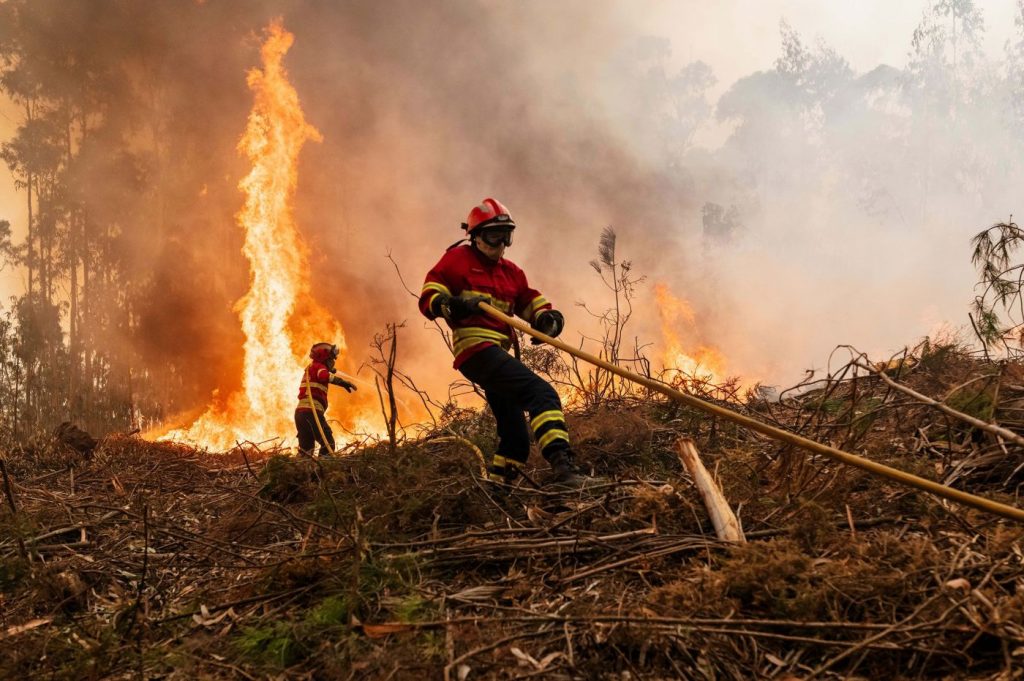Lisbon — For three days in mid-September, wildfires rapidly tore through parts of Portugal, turning the sky a hellish, smoky red against the rolling green hills in the north. In central Portugal, a blaze engulfed a highway, cutting off the top half of the country from the bottom. Nine people were killed.
Few people in other parts of Europe and the US would have realized that some of their everyday products may have played a role in making these fires worse. Certain toilet paper, tissue and office paper brands are made with materials from eucalyptus trees, a non-native species to Portugal.
The eucalyptus globulus — also known as the Tasmanian blue gum — is an ideal tree for commercial cultivation because it’s faster-growing, has a larger amount of fiber and produces more pulp than most other species. That means it can be made into high-quality paper and tissue in an efficient and economical way.
The problem is eucalyptus trees are particularly flammable. That’s especially dangerous as the planet heats up from nearly two centuries of humans burning fossil fuels at an industrial scale.
The eucalyptus tree is native to Australia and provides food and shelter to koalas, among other wildlife. It has spread rapidly in other countries, too, including Portugal, where it was introduced in the early 19th century.
As the Portuguese paper and timber industries grew in the mid-1900s, so too did eucalyptus plantations, and the species now covers nearly 2 million acres. That’s almost one-tenth of the entire country, and a quarter of its total forested area.
Proportional to its size, Portugal has more eucalyptus than any country in the world. Miles and miles of the trees blanket the landscape like “green deserts,” as some Portuguese say. But it’s not the only nation to allow the species’ spread. In California, the eucalyptus tree has been naturalized, meaning it now grows beyond the places it was planted.
A debate over the role of eucalyptus in wildfires in both California and Portugal is brewing, with some studies showing they have little influence in making blazes worse. Yet some experts warn these trees — especially their bark, twigs and leaves — are more flammable than other species. In California, the National Park Service manages the trees as fire hazards.
A Portuguese environmental group called Quercus — the scientific name for the oak tree — wants to dial back the spread of eucalyptus trees and encourage more growth of the native oak.
Domingos Patacho, a forest engineer with Quercus, said one of the reasons eucalyptus trees are so flammable is because their leaves and branches decompose very slowly in Portuguese soil, which hasn’t adapted to the species, leaving kindling lying on the forest floor.
Wildfires burning eucalyptus spread more quickly and jump more easily to other areas, he said.
“It has a split bark which releases itself, catches fire and then is projected over large distances,” Patacho told CNN.
These incandescent bits of eucalyptus bark are carried by the wind — sometimes over several miles — and can create “secondary ignitions” and open up other fronts, outmaneuvering firefighters, he said.
Northwestern Portugal also has other factors working against it when it comes to increasing fire risk, said Henrique Pereira dos Santos, a Portuguese landscape architect.
Unlike parts of Greece and Italy, for example, where scorching summers mean weeds and other plants that can fuel fires tend to grow slowly, northwestern Portugal, with its proximity to the Atlantic ocean, remains cooler and more humid — ideal growing conditions for this kind of vegetation, de Santos said. And natural fire fuels that usually stop growing during cold seasons in places like Finland continue to bloom in Portugal’s mild winter.
“We have a combination of poor soils, unfavorable topography and a climate that favors the accumulation of fine fuels,” he said, referring to grasses, twigs, leaves or needles that can ignite easily when dry.
A town transformed
The central-western Portuguese town of Albergaria-a-Velha was among the worst hit by the September fires, as swaths of the forest and eucalyptus plantations around it went up in flames.
The town’s name is derived from the Portuguese word for “guesthouse” and it historically welcomed pilgrims traveling through the Iberian Peninsula. But in September, it became inhospitable, even deadly, as the fires around it spread into the town and consumed houses and businesses.
Four people were killed and at least 40 families were left homeless as the fire consumed more than 21,000 hectares of land in the town.
Some small landholders in the area sell their eucalyptus wood through a cooperative called the Lower Vouga Forestry Association. Most of it goes to the Navigator Company, a Portugal-based international pulp and paper corporation.
Related Articles
A fireworks show during these hot October nights? Yes there was, and an East Bay fire chief is not happy
A 131-year-old ‘hotel in the mountains’ is roaring back to life in the Angeles National Forest
Some California homesellers are letting buyers who can’t get insured pull out of deals
Dino Fire grows to 80% containment Friday morning
DNA on ignition device links man to Line fire, California authorities say
The company — Portugal’s biggest producer of eucalyptus materials — represents around 1% of the country’s GDP, exporting its products across the world. Navigator claims it produces “the world’s best-selling premium paper” that enjoys “a significant market share in the United States.”
The company and its subsidiaries also produce tissues, toilet paper and kitchen rolls, which it sells in Europe. In the UK, these are sold under well-known brands like Elegance, Magnum and Softy.
Navigator owns or leases more than 260,000 acres — an area bigger than New York City. The company also buys from small landowners and cooperatives.
“I’m a big defender of the eucalyptus as a species because it’s the only one that currently allows us to monetize the investment in the forest,” Luís Sarabando, technical director of the Lower Vouga Forestry Association, told CNN. “But we need to correct some mistakes and excesses of the past, namely the lack of respect for environmental values.”
He pointed to excessive expansion into areas that aren’t productive, and plantations that aren’t diversified with other species. Breaking up the eucalyptus trees with other species encourages biodiversity and can protect against the rapid spread of fires, Sarabando said.
In an email to CNN, Navigator confirmed its plantations were affected by the September fires, but said the eucalyptus tree itself was not a main cause, pointing instead to strong winds, high temperatures and low humidity at the time. The company is still assessing the damage, but said the better-managed areas of its plantations withstood the fires.
Navigator said it spends nearly $3.3 million annually on projects to help prevent and manage fires, and it manages forest fuel by clearing undergrowth, carrying out controlled burning and using herbicides. The company gives free technical support and training to small landholders, and in partnership with other companies, also employs its own firefighters.
It added it has supported 10,000 small landowners over the past six years to help improve management of 90,000 hectares of land.
Another problem for the management of eucalyptus is that the almost all forest in Portugal is in the hands of the private sector, and in the center and the north, territory has been divided into smaller and smaller plots of land from one generation to another.
Sarabando said the area under his cooperative is one of the “better managed in Portugal,” in part because of support from Navigator and other partners. But just 30% of the country’s forest is properly maintained and around 40% of it has been abandoned altogether, he said.
Still, the extent of September’s large fires surprised him.
“I never thought this could happen in my region,” he said.
The-CNN-Wire
& © 2024 Cable News Network, Inc., a Warner Bros. Discovery Company. All rights reserved.


